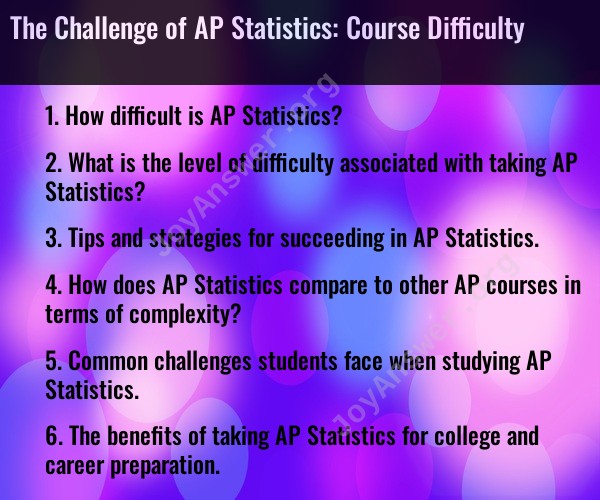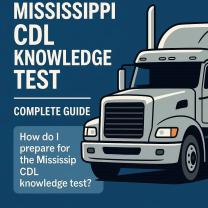How difficult is AP Statistics?
The difficulty of AP Statistics can vary from student to student and depends on your background, aptitude for math, and your approach to the subject. AP Statistics is designed to be a college-level introductory statistics course, and it covers a wide range of statistical concepts and methods. Here are some factors to consider when assessing the difficulty of AP Statistics:
Prerequisite Knowledge: A strong foundation in algebra is essential for success in AP Statistics. You should be comfortable with algebraic concepts and basic mathematical operations.
Statistical Concepts: AP Statistics covers a broad array of statistical concepts, including data analysis, probability, random variables, sampling, hypothesis testing, and regression analysis. Some students may find certain topics more challenging than others, depending on their prior exposure to statistics.
Critical Thinking: AP Statistics emphasizes critical thinking and the ability to apply statistical methods to real-world situations. You'll need to think analytically, interpret data, and draw conclusions.
AP Exam: The AP Statistics exam is known for its complexity and the need to apply statistical concepts to novel situations. The exam consists of both multiple-choice and free-response questions, which require a solid understanding of the course material.
Homework and Practice: Regular practice and homework are key to mastering the material. It's important to work through problems and practice with real data sets to develop your skills.
Quality of Instruction: The difficulty of the course can also depend on the quality of instruction and the teaching methods used by your AP Statistics teacher. A well-structured course and an experienced teacher can make a significant difference in your understanding of the subject.
Study Habits: Your study habits and time management skills play a critical role in your success. Effective study habits, organization, and time allocation are essential for managing the coursework.
Overall, while AP Statistics is a challenging course, it is often considered one of the more manageable AP courses in comparison to subjects like AP Calculus or AP Physics. With the right preparation, dedication, and support, many students can successfully complete the course and perform well on the AP exam. If you have a genuine interest in statistics or plan to pursue a field that involves statistical analysis, the course can be particularly rewarding and beneficial for your future academic and career endeavors.
What is the level of difficulty associated with taking AP Statistics?
AP Statistics is a challenging course that covers a wide range of topics, including probability, data analysis, statistical inference, and experimental design. The course is designed to be taught at the college level, and it is important for students to have a strong foundation in mathematics before taking it.
According to the College Board, the average AP Statistics score in 2023 was 2.89 out of 5. This indicates that the course is challenging, but it is possible for students to succeed with hard work and dedication.
Tips and strategies for succeeding in AP Statistics
Here are some tips and strategies for succeeding in AP Statistics:
- Master the basics. Make sure you have a strong understanding of the fundamental concepts in statistics, such as probability, sampling, and hypothesis testing.
- Practice regularly. The best way to improve your understanding of statistics is to practice solving problems. There are many resources available online and in textbooks that can provide you with practice problems.
- Form a study group. Studying with other students can help you to stay motivated and learn from each other.
- Get help from your teacher. If you are struggling with a particular concept, don't be afraid to ask your teacher for help. They are there to help you succeed.
- Use your resources. There are many resources available to help you succeed in AP Statistics, such as online tutorials, practice problems, and review books.
How does AP Statistics compare to other AP courses in terms of complexity?
AP Statistics is generally considered to be one of the more challenging AP courses. It requires a strong foundation in mathematics, and it covers a wide range of complex topics.
According to a 2022 survey by the College Board, AP Statistics ranked 6th out of 38 AP courses in terms of difficulty. This means that it is one of the more challenging AP courses, but it is not the most challenging.
Common challenges students face when studying AP Statistics
Some common challenges that students face when studying AP Statistics include:
- Understanding the concepts. Statistics can be a difficult subject to understand, and it can take time to master the concepts.
- Applying the concepts to real-world problems. It can be difficult to apply the statistical concepts that you learn in class to real-world problems.
- Managing the workload. AP Statistics is a challenging course with a lot of material to cover. It is important to manage your time wisely and to stay on top of the workload.
The benefits of taking AP Statistics for college and career preparation
Taking AP Statistics can offer a number of benefits for college and career preparation. These benefits include:
- Gaining a strong foundation in statistics. Statistics is an important skill in many different fields, including business, science, and engineering. Taking AP Statistics can give you a strong foundation in statistics that you will be able to use in your college and career.
- Impressing college admissions officers. Taking AP Statistics shows college admissions officers that you are challenging yourself and that you are interested in taking college-level courses.
- Earning college credit. Many colleges offer credit for AP Statistics. This can save you time and money in college.
- Developing critical thinking and problem-solving skills. AP Statistics teaches you how to think critically about data and how to solve problems using statistical methods. These are important skills for success in college and in the workplace.
Overall, AP Statistics is a challenging but rewarding course. It can provide you with the skills and knowledge that you need to succeed in college and in the workplace.












